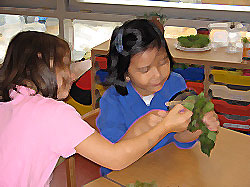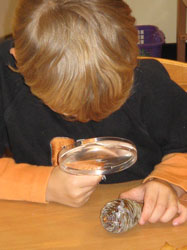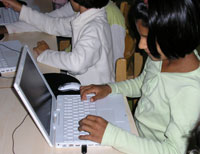The Campus des Nations science
curriculum leads students to an appreciation and awareness of the world
as viewed through the eyes of a scientist. It provides an engaging and
active experience of the scientific process.
Our science curriculum promotes curiosity and inquiry through the exploration
of our surroundings and develops in children a sense of responsibility
towards the environment through balanced study.
It involves the acquisition of scientific knowledge, skills and processes
and develops an awareness in each student of the inter-connection of science
and technology.
The science curriculum is taught through the Programme of Inquiry, and
is arranged into four main strands:
| Living Things |
Earth and Space |
Materials and Matter |
Forces and Energy |
is the study of humans and other animals, plants and the environment and the interactions between them. |
is the study of the planet Earth and its relationship to the universe. |
is the study of the origins, properties and uses of natural and man-made solids, liquids and gases. |
is the study of energy, its origins and transfer and its effects. |
Scientific Skills and Processes
| Students will develop a systematic approach to scientific inquiry. They will formulate questions, observe, plan, collect, organize and interpret data and present research findings. |
 |
 |
Students
will develop an understanding of science in everyday life and apply
previously acquired knowledge in practical or new ways. |
|
Students
will be able to work safely and will learn to use information technology
to collect, store, retrieve and present scientific information. |
 |
These Units of Inquiry focus on Science
Strand |
Related Concepts |
|||
Sharing the planet |
Caring for living things |
Living things |
|
|
How the world works |
The changing seasons |
Living things Earth and space |
|
|
Sharing the planet |
Our garden paradise |
Materials and matter Living things – animals and plants |
|
|
How the world works |
Where does our food come from? |
Materials and matter Living things – animals and plants |
|
|
How the world works |
A roof over my head |
Materials and matter |
|
|
Sharing the Planet |
Life Cycles |
Living things – Animals & Plants |
|
|
How the world works |
Materials |
Materials and matter - General |
|
|
Sharing the Planet |
Our world of plants |
Living things - Plants |
|
|
Who we are |
Healthy Living |
Living things - ourselves |
|
|
How the world works |
Simple Machines |
Forces and energy – movement & gravity |
|
|
Sharing the planet |
Water |
Materials
and matter |
|
|
How the world works |
Kitchen Chemistry |
Materials and matter |
|
|
Sharing the planet |
Animal Kingdom |
Living things - Animals |
|
|
Who we are |
Human Body |
Living
things - |
|
|
How
the world works |
Forces and motion |
Forces and energy – Movement, Gravity, Magnetism |
|
|
Sharing the planet |
Ecosystems |
Living
things - |
|
|
| Year 6 | Who we are |
Growth and Change |
Living Things - ourselves |
|
How the world works |
Energy |
Forces and energy |
|
| Demonstrations of deeper learning in responsible behaviour through positive action and service; a manifestation in practice of the other essential elements | Powerful ideas which have relevance within and across the disciplines and which students must explore and re-explore in order to develop understanding | Significant, relevant, subject matter which students are expected to explore and know about Click here to find out more about the 6 themes Click here to find out more about the 6 subject areas
| Those things which the students need to be able to do to succeed in a changing, challenging world | Dispositions which are expressions of fundamental values, beliefs and feelings about learning, the environment and people |
updated 13 fÈvrier, 2007